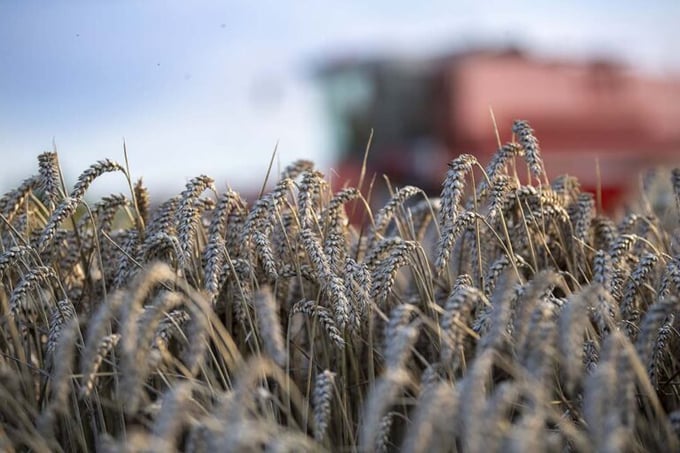November 23, 2025 | 05:25 GMT +7
November 23, 2025 | 05:25 GMT +7
Hotline: 0913.378.918
November 23, 2025 | 05:25 GMT +7
Hotline: 0913.378.918

Feed ingredients will tend to trade at lower levels in 2024, but weather risks posed by climate change also need to be considered, as El Nino will offer more challenges than opportunities depending on its intensity. Photo: Mark Pasveer
With declines expected in pork and beef markets, poultry is expected to be the fastest-growing protein in a global animal protein market forecast to grow just 0.4% year over year, according to a recent Rabobank report. Lower input costs, and therefore lower-priced chicken, should help stimulate chicken consumption in 2024 and accelerate growth in the industry.
Recovering growth for global poultry industry
The 2024 outlook for the global poultry market is moderately positive, with a forecast of 1.5% to 2% growth. Though a decline from the long-term average of 2.5% per year, it marks a sign of recovery compared to 2023, when growth was only 1.1%. Most growth is expected in Southeast Asia, the Middle East and Latin America, but at below-average levels. “Producers will need to keep balancing supply growth with relatively slow demand growth, especially in the US, Thailand, Indonesia, and more recently in China and the EU, which have been struggling with oversupply,” said Nan-Dirk Mulder, senior analyst – animal protein at Rabobank. Although growth is recovering, it is crucial for regions to maintain market balance in the still price-driven, volatile market environment. “Oversupply can significantly impact profitability, as we saw earlier in 2023 in Brazil, the US, and South Africa,” said Mulder.
Price-driven markets to challenge industry
Consumers will remain sensitive to prices due to the weak economic context, and pressure to supply affordable products to customers via price-driven channels will persist. In this context, poultry will continue to benefit from downtrading in terms of meat type and product category. But as wages have increasingly risen in line with earlier inflation, value-based market opportunities will gradually return as consumer price inflation lowers. Nevertheless, price-driven markets will be an ongoing challenge for producers in 2024, as the industry will still face relatively high costs and potential volatility. Feed costs will move slightly lower, but global geopolitical issues like the Ukraine war, turmoil in the Middle East and weather risks could affect feed costs, as well as oil and gas prices.
Moreover, the fast growth in global trade seen in 2022 and early 2023 has started to slow. Trade will not be easy but will keep growing, mainly in raw chicken meat, and the market will gradually recover on improving consumer spending power in several key markets, like the EU, UK and U.S.
Avian influenza: a wild card
The biggest wild card for the outlook in 2024 will be avian influenza, which is already impacting production and trade from Europe and the U.S., and the pressure is increasing. Outbreaks in North America, Europe and Asia started relatively early in the Northern Hemisphere winter season, a potential indication that this year could become a higher-pressure year than the 2022/2023 winter season. North America, Canada, Mexico and key production areas in the U.S. have seen cases in commercial farms, mainly in turkeys and layers. In Europe, there have been cases in the key production countries of the UK, the Netherlands, Germany, Denmark, France and Hungary. Japan has also had its first case. “These relatively early outbreaks in the Northern Hemisphere winter season should be a major wake-up call for the industry to keep biosecurity at its highest level,” said Mulder.
In this ongoing price-driven market context with high and volatile input costs and avian influenza risks, producers should focus on optimal efficiency, procurement and biosecurity, but improving spending power should gradually lead to improving demand for more premium and value-added products.
Rabobank

(VAN) In a new study published in Trends in Biotechnology, researchers used a gene-editing technology called CRISPR to increase a fungus's production efficiency and cut its production-related environmental impact by as much as 61%- all without adding any foreign DNA.

(VAN) A top official in Beijing’s Cop delegation says China is committed to clean energy – but US’s absence is a problem.

(VAN) The Bangsamoro region’s inflation rate rose slightly to –1.3 percent in October 2025 from –1.5 percent in September, the Philippine Statistics Authority (PSA-BARMM) reported.

(VAN) FAO-led report says protecting and restoring forests is crucial to boosting climate-resilient agriculture, rural livelihoods and global food and water security.

(VAN) Flagship partnership secures additional GBP 16.9 million to strengthen forest monitoring, transparency and country support to 2030.

(VAN) After a turbulent year for international development, the aid and assistance landscape has shifted, with donors rethinking how, where and why they support sustainable development.

(VAN) A new tool for measuring the economic value of farm animal welfare improvements has been developed, potentially transforming how consumers, retailers and the government evaluate animal welfare policies.